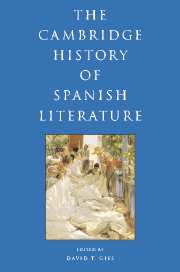Book contents
- Frontmatter
- I INTRODUCTION
- II HISTORY AND CANONICITY
- III THE MEDIEVAL PERIOD
- IV EARLY MODERN SPAIN: RENAISSANCE AND BAROQUE
- V THE ENLIGHTENMENT AND NEOCLASSICISM
- VI THE FORGING OF A NATION: THE NINETEENTH CENTURY
- 22 Romanticism in Spain
- 23 The theatre in Romantic Spain
- 24 Mariano José de Larra
- 25 Romantic poetry
- 26 Romantic prose, journalism, and costumbrismo
- 27 Benito Pérez Galdós
- 28 The Realist novel
- 29 The Naturalist novel
- 30 The theatre in Spain 1850–1900
- 31 Poetry in the second half of the nineteenth century
- VII THE MODERN, MODERNISMO, AND THE TURN OF THE CENTURY
- VIII TWENTIETH-CENTURY SPAIN AND THE CIVIL WAR
- IX IN AND OUT OF FRANCO SPAIN
- X POST-FRANCO SPANISH LITERATURE AND FILM
- Bibliography
- Index
24 - Mariano José de Larra
from VI - THE FORGING OF A NATION: THE NINETEENTH CENTURY
Published online by Cambridge University Press: 28 March 2008
- Frontmatter
- I INTRODUCTION
- II HISTORY AND CANONICITY
- III THE MEDIEVAL PERIOD
- IV EARLY MODERN SPAIN: RENAISSANCE AND BAROQUE
- V THE ENLIGHTENMENT AND NEOCLASSICISM
- VI THE FORGING OF A NATION: THE NINETEENTH CENTURY
- 22 Romanticism in Spain
- 23 The theatre in Romantic Spain
- 24 Mariano José de Larra
- 25 Romantic poetry
- 26 Romantic prose, journalism, and costumbrismo
- 27 Benito Pérez Galdós
- 28 The Realist novel
- 29 The Naturalist novel
- 30 The theatre in Spain 1850–1900
- 31 Poetry in the second half of the nineteenth century
- VII THE MODERN, MODERNISMO, AND THE TURN OF THE CENTURY
- VIII TWENTIETH-CENTURY SPAIN AND THE CIVIL WAR
- IX IN AND OUT OF FRANCO SPAIN
- X POST-FRANCO SPANISH LITERATURE AND FILM
- Bibliography
- Index
Summary
Larra (1809–1837), the best journalist in nineteenth-century Spain and one of the century’s greatest prose stylists, was the son of an afrancesado physician who emigrated to France in 1813. Upon his return to Spain four years later, he enrolled in various courses of study without ever completing a degree. He founded two newspapers – El Duende Satírico del Día (“The Satiric Sprite of the Day,” 1828) and El Pobrecito Hablador (“The Poor Little Chatterer,” 1832) – and published numerous articles in other newspapers: La Revista Española (“The Spanish Journal,” December 1832 – January/February 1835), El Correo de las Damas (“The Ladies’ Journal,” June 1833 – May 1834), El Observador (“The Observer,” October–December 1834), El Español (“The Spaniard,” November 1835 –February 1837), El Mundo (“The World,” December 1836 – January 1837), and El Redactor General (“The General Editor,” December 1836). The wit and mordacity of his satire drew wide attention and high public praise (he was also well compensated for his work). Larra wrote one historical novel, El doncel de don Enrique el doliente (“Don Enrique the Sorrowful’s Young Nobleman,” 1834), one play, Macías (1834), and many adaptations and translations of European plays, but it is his newspaper work which is most remembered today. His writing, marked by both historical and personal events, can be divided into two stages: one of hope and optimism, the other of doubt and despair. Nevertheless, due largely to his ongoing battles with the crushing censorship that severely cramped his style, his despair is evident in both stages, and when that censorship came first to threaten his professional autonomy, and later his personal safety, Larra fled discouraged, first from Spain and then from life itself.
- Type
- Chapter
- Information
- The Cambridge History of Spanish Literature , pp. 362 - 370Publisher: Cambridge University PressPrint publication year: 2005
- 1
- Cited by



